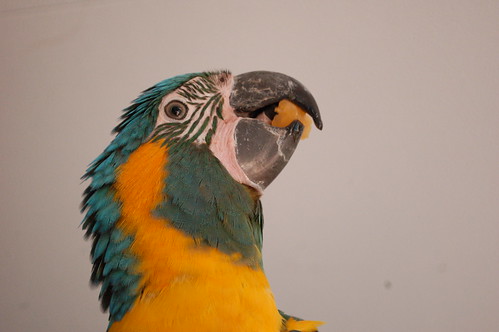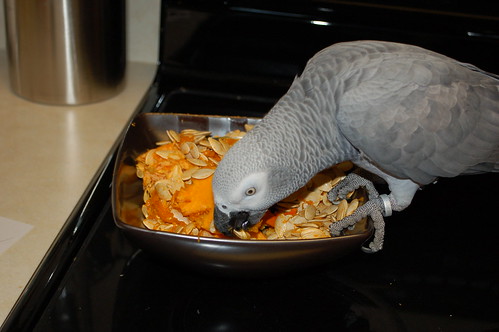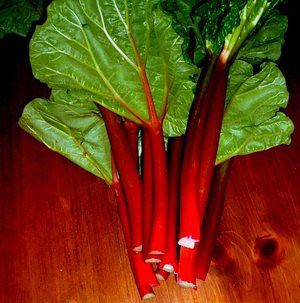
There are always so many questions about the foods which are, or are not, appropriate in a parrot’s diet. I apologize for repeating this so many times in my posts, but I firmly believe that diet is the most important part of our parrot’s daily care. Everything else you try to accomplish for your bird is lost on an energy-less, ill-feeling bird if you fail in this one area. Without good health, a parrot’s life is, at best, not all it can be, and at worst, a tragedy waiting to happen.
The list of should/can feed items is very long. Fresh fruits and veggies should be the biggest part of the daily diet. Grains (cooked and raw) and legumes (only cooked or sprouted), pastas, nuts and pellets should also be worked into the diet regularly.
More important is the list of foods that are dangerous. It is a short list, but it is imperative that we be aware of those things which are hazardous to our birds.

It is incorrect to assume that parrots innately know which foods are dangerous for them. In fact, a parrot learns these things from their parents and flock mates in the wild. Most of our birds have not had that advantage. Even our wild caught birds are being fed a captive bird diet and the foods that we give them are not the same as those they would have been exposed to in their native lands. So any of their acquired wild knowledge, should they retain it, is irrelevant.
To keep things simple, I will address only the foods that are known to be toxic, foods to be avoided (even though many of these are debated), and the parts of acceptable foods that should be removed when you serve them.
Following is the list of foods you must NEVER let your bird eat or drink:
- Avocado – The pit and skin are the most toxic parts of the avocado, but even the flesh can kill a bird within minutes. I know of a few instances where this happened to birds after being fed guacamole by their unaware owners.
- Chocolate – Contains the compound theobromine, which speeds up the metabolism. The darker chocolates containing a higher percentage of cacao, which are also the more pricey chocolates, are the most dangerous. Chocolate toxicity can be fatal.
- Caffeine – This speeds up the metabolism in an animal with already high metabolic rates. It can bring on cardiac distress and death.
- Alcohol – Alcohol depresses the organ system and can be fatal, even in small amounts.
- Salt/Sugar – Sodium (salt) is a necessity in all living creatures. However, too much salt can bring on dehydration and kidney dysfunction. The different foods we eat contains both salts and sugars naturally. It is unnecessary and unsafe to add these ingredients to our bird’s foods.
- Raw honey – This contains fairly high levels of botulism and should not be fed to birds or infants. Used pasteurized honey instead.
5/19/11
**Note regarding pasteurized honey: One of our readers brought forth a very good point and one that I hadn’t considered. For honey to truly be pasteurized, it would have to be heated to temperatures that would change the consistency, caramelizing it into a near solid instead of the syrup we are familiar with. Therefore, it is not possible that it is pasteurized. She stated that in Canada, labeling may not use the word “pasteurized” for this reason. There isn’t a lot of reason for us to be using honey with our birds, I had been using it in tea that I sometimes share with them, but that all honey may still contain botulism spores is a concern to me. If you find the need for a sweetener, use agave nectar.

The following is a list of those foods which are considered questionable, and, as I mentioned above, many are debated. I, personally, choose to include some of these foods in my own bird’s diets because I have always offered them and have had no problems with them. I will give you the pros and cons of each, and let you make your choice:
- Dairy products – Birds are lactose intolerant. This is fact. However, birds do love cheese, and when given in small amounts infrequently, most do not have a problem digesting it. My cockatiels have played “bobbing for Cheerios” in my cereal bowl since I’ve had them.
- Peanuts/peanut butter – Peanuts can contain aflotoxins, a carcinogenic substance, as can tree nuts, grains, cereals and corn. Peanut shells can also harbor fungus, I am more concerned about this factor, so I buy raw peanuts and bake them myself. Commercial peanut butters have a lower contamination of aflotoxins than do the more natural brands. This is one of the few instances where over-processing is a good thing. I should also point out that there are rare occasions of peanut allergies in birds. Just like similar allergies in humans, this is only discovered once it has been eaten.
- Onion – Onions can bring on digestive discomforts in both birds and humans, especially when eaten raw. Excessive amounts can also cause anemia.
- Garlic – Over indulgence in garlic can cause anemia.
- Mushrooms – Mushrooms are a fungus. Some species have toxicity, some more than others. While birds do seem to enjoy the texture, they are worthless nutritionally. I don’t feed them to my birds because there are no benefits to balance out any potential risks.
- Fruit seeds and pits – The seeds and pits from certain fruits: apples, pears, peaches, cherries, apricots, nectarines and plums contain low levels of a cyanide-like compound and if eaten in quantity can be fatal to your bird. Your bird should never have access to these seeds or pits. However, the seeds from the following are safe: grapes, citrus fruits, squashes, pumpkins, tomatoes, melons, pomegranate, mango and berry seeds.
- Cabbage – Cabbage and leafy greens contain oxalic acids which interferes with calcium absorption in the meals that follow. However, kale, for instance, is one of the most nutrient rich foods we can offer to our birds. Unless your bird is producing eggs or molting, both of which require a strong calcium supply in the body, or has a known calcium deficiency for other reasons, these foods should be a big part of the diet. Why some people single out cabbage as an unsuitable food is beyond me.
- Rhubarb – Raw rhubarb has very high levels of oxalic acid, especially in the leaves. It is said that once cooked, it drops to an acceptable level making it a safe food. Other sources say that the levels do not drop acceptably. Because rhubarb is in such debate, and I do not feel I can make an informed decision, I have dropped it off of my “safe” list.
- Asparagus – Asparagus has been said to cause severe digestive upsets in some birds and humans. I have never seen this in my own birds, a couple of whom just love it. Because the word severe unnerves me, I now only feed it 2 or 3 times a year, still, though, without any problems.
- Eggplant – It is also said that eggplant, due to the solanin it contains, can cause stomach upsets, although I am unaware of any instances of this happening. Most sites have eggplant on the safe list. My birds aren’t crazy about it, cooked or raw, and get it occasionally in my effort to vary their diets.

This list will be ever changing as we learn more about our avian companions, and it will never be complete as new considerations come to light. Most owners fall into two categories: those who will serve certain foods because their experience is that their birds have shown tolerance, and those who refuse because they don’t wish to take the risk. Of the foods listed above, I have never known, or heard of, any bird suffering more than mild stomach upset following consumption. It is up to the individual to determine how well their bird’s tolerate certain aspects of their diet. However, I suspect that a bird would simply, in the future, refuse a food that caused distress.
Moderation is the best way to avoid diet problems. We should do our best to vary our bird’s diets. In doing this, not only do we make eating a more enriching experience for them, but it helps us see that they are getting all that their bodies require nutritionally. In a widely varied diet, all of the foods you offer are given in moderation automatically because there is so much to choose from.
Author Patty Jourgensen specializes in avian health, behavior and nutrition and has been working with and caring for rescue birds since 1987.



45 comments
My conures love bok choi,I still keep it moderate. Is that cool?
Thank you for this info! I have a common mynah, 3 rescue starlings (a 2 year old, a 1 year old, and a fledgeling)(where I live, the dept of natural resources encourage people to kill them, but understands that some people can’t do that – especially to a highly intelligent and easily taught species like european starlings. So they don’t want rescued babies to be released so they won’t breed and ad to the millions already in the state). I alsa have a 3 year old lovebird and a 2 month old sun conure. The starlings and mynah have them same “never feed” list, with the addition of always limit iron from animal sources. The mynah and two of the starlings have run of their room. Since I frequently eat with my birds, in general, I eat things the birds can have. They steal some of my food, so its worked out to be an effective way to get them to try new foods. When I want something they can’t have, I top?cally get it at a restaurant. This list of dangerous foods will help me expand the diets for my birds and myself.
In fact, unlike many other dairy products, cheese, in general, is very low in lactose. Most contain less than 1 gram per serving and should not cause any lactose intolerance related symptoms.
I have tried bell peppers and pepper seeds with my conure and Amazon. They don’t like them, but now I wonder about its safety.
I can only give my galah 2 nuts max per day they make his droppings runny. He loves to tear up a small bit of seedy bread but mostly it just gets thrown on floor. Same with baby spinach.
Yay! I’m glad I’m not poisoning my bird, she tastes just about every meal I eat! I knew about everything in that top list, so I’ve had to hide sweets from her. I’m relieved its okay she gets a small amount of cheese. Thank you for this list!
Can you feed a macaw onion bhaji. I’m upset as passed away. I didn’t feed him that.
My amazon is now 28 years old. I change his liner daily and spray cage with 50% vinegar and 50% water and give a good wipe down. (while he’s out of cage for playtime). I also give his cage a good scrub down with hot soapy water and rinse well,once a week.
Ok hold on… I just bought ‘Forti-Diet’ honey treat that’s supposed to be specifically for parrots. And it does say there is ‘honey’ in the ingredients. Does this mean it will harm my Amazon baby if I give it to her??
My parrot loves milk… is it alright to give him milk ?
Dear patty, this has been very helpful, I have 2 quaker parrots and i wanted to ask if it was ok if they ate spinach or yogurt, they LOVE the yogurt, everything i buy is organic.
I did not know not to feed raw organic honey to my Conure and he just ate about 6 bites! What should I look for and how long untill I know if he will be safe? Thank you!
Hi all. I have an african grey and the bird sitter at one time fed him raw eggs. Well he seems fine and healthy but will this have an effect on him? Will he die? Tanswell
Do you have any info on ground cinnamon?
I have two tiny parrotlets. I do not know their classification name so I call them parrotlets. They are as tall as my index finger and are in the parrot family. I have been feeding them sunflower seeds that I grew for them this summer and then the person who gave the birds to me told me that sunflower seeds can kill them! Is this true and if so ….why? They love millet seed as one of their favorite foods and sunflower seeds are their favorite. I have been feeding them the sunflowers for a month now and they seem to be suffering no ill or adverse effects at all. Please enlighten me on this subject. I have stopped feeding them sunflower until I hear back on this matter. Thankyou very much for your time!
Hi Kerry and Frankie, My understanding is that all soybeans (there are many varieties of soybean plants) MUST be cooked to make them safe to eat, but some must be fermented. Unfortunately, Frankie is going to have to live without his his morning coffee. Half caffs contain caffeine, just less. If you were referring to agave nectar, that is fine. The plant, howeve, is toxic. Try giving Frankie a cup of warm water sweetened with the nectar instead, no more coffee though! I’ll bet he likes it just as much. Patty
Hi Kathy, No you don’t HAVE to bake them, I choose to to get rid of any fungi in the shells. Patty
Hi Barbara, Oatmeal is great, but best served plain (meaning no milk or sugar). Try sprinkling a little ground cinnamon over it! Patty
Hi Jessie, Banana seeds are fine, fortunately. Can you imagine the chore of having to pick them out? You can give your bird cornflakes, but remember to offer them only as treats. You want them to fill up on the good stuff first! SLOWLY reduce the amount of seeds you are mixing with the better foods. I’m willing to bet they are eating more than you think. Playing with food is the first step to eating it anyways. Keep that up, and don’t eliminate too much seed too quickly so that they continue to test out the new foods, even if it is only because they have to pick through it to get to the seeds! You are doing a great job, Jessie! That’s a great idea for a post. I’ll try to get it out early next week. Patty PS – Your freezing method is perfect!
Hi Jaonn, Sorry for the delay. Olives are a wonderfully healthy food BUT they are very oily and salty, particularly the green ones. You can serve them occasionally, but try to get the ones packed in water instead of brine. Patty
Hi Jabberbird, It doesn’t mean you have to cut the soy out completely. Just be aware of the potential for risks with certain foods and watch his response to them. Many of the foods on the “iffy” list in my post I still serve in moderation. I am aware of their down sides, and keep an eye on their poops and behaviors (which I ALWAYS do anyways), but the good things in many of these foods outweigh the possible risks, in my opinion. Patty
Patty Im sorry to wright a second time . But have you found out about an answer on the olives yet?? with many thanks Joann
Does anyone know about Oatmeal? My Quakers love it. I buy plain oatmeal and just add a little water. Microwave it for 12 seconds. They end up eating about a tablespoon worth. Any thoughts? Thanks
great informative website learning a lot from you thankyou
Our Amazon, Paulie, begs for the uneaten milk from our cereal each morning and sits on “his” dining room chair every evening about 9 PM and begs (shouts “cracker, cracker,cracker”) until he gets his nightly spoonful of ice cream. We’ve had him for over 12 yrs. and, so far, he has shown no signs of lactose intolerance. Are we slowly killing our baby by giving in to his desires? ’
-
1
-
2
NextLeave a comment